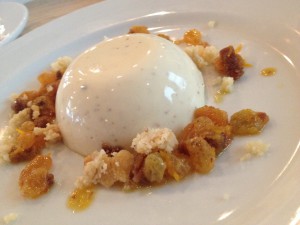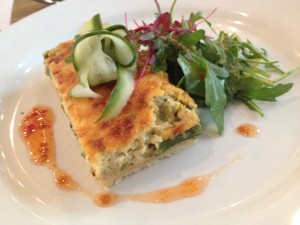The post Belgian Bacon & Mushroom Pudding. A recipe from IBM’s Watson #CognitiveCooking appeared first on Incogvino.
]]>
Belgian Bacon Pudding. A recipe from IBM’s Watson SuperComputer.
At a recent event with IBM at The Griffin, the Incogvino JHB team got to experience some cognitive cooking (and human wine pairings). The recipe below was generated by Watson, IBM’s SuperComputer.
Inputs used to generate this recipe:
- Primary ingredient: Bacon
- Primary style: Belgian
- Unique recipe, never seen before.
Pairs with: We don’t know! The Chef changed this course because he just didn’t “get” the flavours. Thankfully we forced him to bring out his trial dishes. Tres #YUM! What pairs with bacon?
Belgian bacon and porcini mushroom pudding
500ml cream
110g bacon: rendered, fat reserved
porcini mushroom powder: 2 teaspoons
ground black pepper: 1/4 teaspoons
granulated sugar: 3/4 cup
egg yolks: 2
sheet gelatin : 4 pieces, in cold water
500ml buttermilk
unsalted butter: 7 tablespoons
almond flour : 1/2 cup, finely ground
all-purpose flour: 1/2 cup
fine sea salt: pinch, more as needed
Icing sugar,: 1 1/4 cup, more as needed
large egg whites: 4
extra virgin olive oil : 2 tablespoons
orange: juice and zest of one
honey: 1 tablespoon
ground cumin : pinch
ground caraway: pinch
golden raisins: 1/2 cup
dried figs: 1/2 cup, stem tips removed and roughly chopped
Method
Make the bacon-porcini pudding, gently heat the cream to approximately 65˚C; add the warm rendered bacon and fat and infuse for at least 4-6 hours, chilled. After infusing, strain the cream and discard the bacon and congealed fat solids. Add the mushroom powder and black pepper and bring to a boil. Meanwhile, whisk together the sucrose and egg yolks. Temper the hot cream into the yolk mixture and return to low heat, cooking just to 85˚C Remove from heat and add the gelatin. Temper the mixture into the buttermilk and blend well with an immersion blender. Divide into glasses or serving dishes and chill to set.
Next, prepare the walnut financier. Gently cook the butter to a light brown color and reserve warm. Combine the dry ingredients; in another large mixing bowl, manually whip egg whites just until frothy and yellow color dissipates. Whisk in the flour mixture
Slowly whisk in the warm butter, followed by the olive oil, ensuring complete emulsification;chill. Divide the mixture into silicon baking molds; bake at 150˚C until lightly browned and cooked through. Cool and break the financier into small pieces.
To prepare the spiced fruit compote, combine the orange juice and zest, honey and spices and gently warm. Pour the orange-honey mixture over the raisins and figs and macerate several hours, chilled.
To assemble, divide the dried fruit mixture among each set pudding and top with the torn financier pieces. Garnish with a few grains of Maldon salt and a dusting of icing sugar.
The post Belgian Bacon & Mushroom Pudding. A recipe from IBM’s Watson #CognitiveCooking appeared first on Incogvino.
]]>The post Deboned Loin of Lamb with Pinenut Crust. A recipe from IBM’s Watson #CognitiveCooking appeared first on Incogvino.
]]>Inputs used to generate this recipe:
- Primary ingredient: Lamb
- Primary style: Traditional
- Combination recipe using flavour profiling (not necessarily unique).
Pairs with: Rust en Vrede Cabernet Sauvignon 2012.
Deboned loin of lamb with pinenut crust, tarragon gnocchi, savoy cabbage & anchovy stuffing. A recipe from IBM’s Watson.
Lamb
1.15kg toasted pine kernels
4kg butter, softened
10 clove garlic
100 g thyme, leaves only
200 g leaves parsley, chopped
1kg freshwhite breadcrumbs
pinches nutmeg
pinches chinese five spice
olive oil, for frying
20 x 200 g portions lamb loin
Preparation Method:
Put the pine nuts, butter, garlic, herbs, breadcrumbs and spices into a food processor and blend to a coarse paste.
Roll out the pine nut paste between 2 sheets of greaseproof paper until large enough to cover the portions of lamb, then cut in half and chill in the fridge.
Heat a little olive oil in a frying pan, and fry the lamb portions until cooked to your liking. Rest the meat for 10 minutes.
Preheat the grill. Lay a portion of the pine nut crust on top of each lamb portion and cook under the grill until the crust is golden brown.
Tarragon gnocchi
9kg potatoes, peeled
salt and pepper
10 tbsp chopped tarragon
10 tbsp chopped flatleaf parsley
75g plain flour
glug of olive oil
salt and pepper
Preparation method:
To make the gnocchi, cook the potatoes in a pan of as little water as possible until tender. Drain and mash or rice the potatoes while they are still warm.
Turn out the mash onto a work surface, season with salt and pepper and add the herbs. Slowly add the flour in batches, kneading gently by folding the edges of the dough into the center and pressing down lightly before sprinkling in each further addition of flour, until the dough is soft. Don’t overwork the dough or you will spoil the structure and the gnocchi will be powdery on the outside and pulpy on the inside.
Roll the dough into a Frankfurter-sized sausage. Cut the sausage into 3cm pieces.
Press each piece of dough against the back of a fork so that it curves slightly and the prongs leave indentations (which will help the gnocchi hold the sauce).
Bring a large pan of salted water to the boil. Add the olive oil and drop in the gnocchi. Cook for a minute, or until the gnocchi rises to the surface. Remove from the pan, plunge into a bowl of ice-cold water and drain.
Caponata
9 medium aubergines, chopped
salt and freshly ground black pepper
6 tbsp extra virgin olive oil, plus extra for drizzling
2 onion, chopped
4 celery sticks, chopped
800g chopped tomatoes
200g green olives, pitted and sliced
6 tbsp capers, drained and chopped
60ml red wine vinegar
3 tbsp sugar, or to taste
handful flatleaf parsley, chopped
Preparation method:
Sprinkle the aubergines with salt and leave to drain in a colander for 30 minutes.
Heat some of the olive oil in a saucepan and brown the aubergine on a moderate heat for 10 minutes. When cooked, set aside and allow to cool to room temperature.
In a separate saucepan, heat the remaining olive oil and sauté the onion along with the celery and tomatoes. Season with salt and freshly ground black pepper. Add the olives and cook for 20 minutes.
Add the cooled aubergine and the capers.
In a separate bowl, mix together the red wine vinegar and sugar. Add this to the pan and cook for 10 minutes. It is ready when the red wine vinegar has been absorbed & add parsley
Mint gel
¼ cup Fresh mint
1/3 cup Simple Syrup
1/3 cup Water
1 t Sugar
½ t Agar
Preparation Method:
Blanch the mint, shock n dry, Blend syrup with water and mint
Place in bowl in ice bath for 20 minutes. Then strain.
Combine sugar and agar.
Place the mint liquid into a blender on low.
Sift in the agar sugar mixture and blend for 1 minute.
Pour into a sauce pan and bring to boil, simmering for 5 minutes.
Pour into dish and cover chill for 10 minutes.
Blend the mixture till smooth, stain and store.
The post Deboned Loin of Lamb with Pinenut Crust. A recipe from IBM’s Watson #CognitiveCooking appeared first on Incogvino.
]]>The post Swiss Thai Quiche. A recipe from IBM’s Watson #CognitiveCooking appeared first on Incogvino.
]]>
Swiss Thai Quiche, a recipe from IBM’s Watson SuperComputer
At a recent event with IBM at The Griffin, the Incogvino JHB team got to experience some cognitive cooking (and human wine pairings). The recipe below was generated by Watson, IBM’s SuperComputer.
Inputs used to generate this recipe:
- Primary ingredient: Asparagus
- Primary style: Swiss & Thai
- Unique recipe, never seen before.
Pairs with: Jordan Unoaked Chardonnay 2014
Swiss Thai Quiche. A recipe from IBM’s Watson.
155g Butter: divided
82ml Water: divided
2 Egg Yolk: divided
1.5 tsp salt: divided
225g plain flour: sifted
115g Lemongrass: peeled, tender white part only, thinly sliced
115g Leeks:, white part only
25 Asparagus tips: SHORT ONE
3 Eggs
225ml Heavy Cream
225 ml Plain whole-milk yogurt
Mild Curry Powder: 3/8 tsp
Method
Make the pastry dough, place the flour in the bowl of an electric mixer fit with the paddle attachment. Add 1 tsp of salt, 1 egg yolk, and 2.5 oz of water, and mix over low speed. Make sure your butter is room-temperature, and add it, diced, continuing to mix until homogeneous. Take the dough out of the bowl and knead by hand for 1 minute. Shape into a ball, cover with plastic wrap, and refrigerate for at least 1 hour.
Lightly grease the tart molds. Roll the pastry dough to 1/16” thick, into a rectangle of approximately 14” x 16”. Cut out 14 discs of 4” diameter each, and fit them into the tart molds. Refrigerate for 30 minutes.
Meanwhile, make the quiche filling: Melt 2/3 of the butter in a saucepan over medium heat, then sauté the sliced lemongrass and leeks with a dash of salt until soft, stirring regularly. Let cool. Melt 1.5 oz of butter in a saucepan over medium heat, then add 0.4 oz of water and asparagus, season with a dash salt, and cook for a couple of minutes until the asparagus is cooked but still crunchy. Let cool. In a bowl, mix the eggs, 1 egg yolk, heavy cream, curry, coriander, pepper and ¼ tsp of salt. Fold in the yogurt, the sautéd lemongrass and leek, and crumbled feta
Pour the quiche mixture into the molds, arrange 2 asparagus tips on top of each of them, and sprinkle with the grated Gruyère. Bake in a 400º F / 205º C oven for about 30 minutes, until golden brown.
Serve warm with some chopped parsley sprinkled on top.
The post Swiss Thai Quiche. A recipe from IBM’s Watson #CognitiveCooking appeared first on Incogvino.
]]>